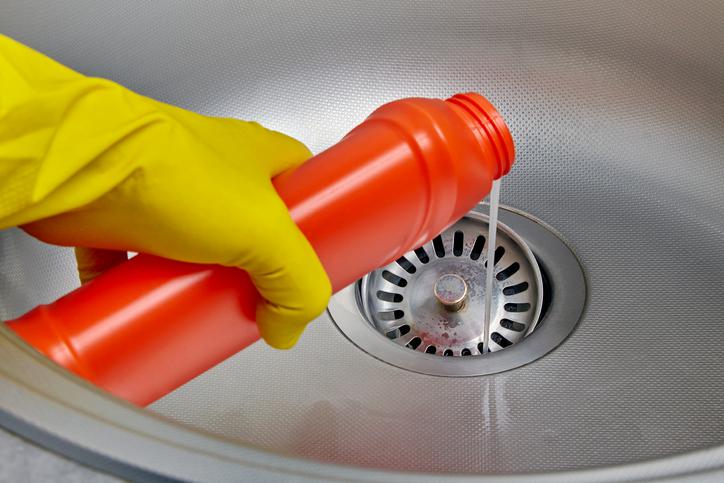
We’ve gone over the list of common household products you should never put down your drain: oils, paint, kitty litter, lint.
And we’ve also talked about the food items that can wreak havoc on your plumbing system if they go down the drain or even the garbage disposal in your kitchen sink.
Yet, if your house has a septic system, there are a few other things that should never end up in your septic tank. You might never have thought of some of them! Read on to learn more.
Chemical drain cleaners
If you have buildup in your drains, and want to reach for a drain cleaner, be careful about the kind of cleaner that you choose. Some have substances that can corrode pipes and other parts of your system.
A septic system relies on bacteria breaking down the solid waste in the septic tank. But if you use a chemical drain cleaner, those can kill the bacteria and prevent it from breaking down the waste.
Avoid synthetic drain cleaners with sodium hydroxide and sulfuric acid, which can corrode your pipes.
If you’re going to use a drain cleaner, make sure you carefully look at the label to see whether it’s deemed septic safe. Or, you could try making your own drain cleaner. Here’s our DIY solution!
Excess water
There is a limit to how much water your septic system can handle.
You can overload the system when wastewater goes into the septic tank at a speed that exceeds the tank’s holding capacity (which varies based upon your household’s use.) When the system is overloaded, solids from the wastewater may not settle properly and could clog the drain field – which could eventually cause the system to break down.
Excess water could also reduce the amount of bacteria in the septic tank, meaning wastewater treatment won't happen as efficiently.
This is yet another reason why water conservation is so important. If you have a septic system, it’s vital to do everything you can to avoid wasting water, both indoors and outdoors. Indoors, the bathroom is a great place to start – here are eight ways you can start to conserve water in the bathroom. Outdoors, there are changes you can make to your landscaping.
Some kinds of toilet paper
Not all toilet paper is created equal, especially when you live in a house that is served by a septic system. Toilet paper that doesn’t dissolve easily can lead to clogs, which nobody wants!
If you have a septic system, look for toilet paper that is labeled biodegradable. It can be a little more expensive, but it does dissolve more quickly in a septic system. Recycled toilet paper is another good option.
This type of toilet paper is usually made of “post-consumer” recycled content, usually previously used paper products. It dissolves easily because it’s typically made of shorter fibers that easily break up, instead of the longer fibers found in brand new toilet paper.
READ MORE: What Is the Best Toilet Paper for Your Septic System?
Having problems with your septic system, or just have questions about how to maintain it?
Give Benjamin Franklin Plumbing a call at at 1-877-BEN-1776, or contact us online.
